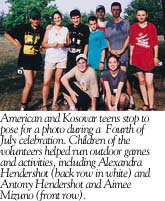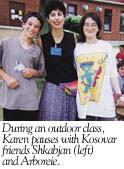
|
  |
 English
as a Second Language (ESL) teachers can usually be spotted
a mile away in any school. We are the ones carrying totes
full of props that help bring the English-speaking world to
our classrooms. I sometimes feel as if I do a kind of stand-up
act, as I will do anything to motivate my students to want
to communicate in English. I believe that through the English
language I build pathways to the common ground we all share
as human beings. English
as a Second Language (ESL) teachers can usually be spotted
a mile away in any school. We are the ones carrying totes
full of props that help bring the English-speaking world to
our classrooms. I sometimes feel as if I do a kind of stand-up
act, as I will do anything to motivate my students to want
to communicate in English. I believe that through the English
language I build pathways to the common ground we all share
as human beings. When I first heard the U.S. government was airlifting ethnic Albanian Kosovars to Fort Dix last year during the crisis in Kosovo, I thought that my expertise in teaching ESL might be of assistance. I managed to connect with the right people and was invited to a meeting for potential volunteers where we learned, among other things, that the Kosovar "guests" were to be housed in converted barracks, referred to as "dorms," with color-coded doors for easy identification. The Spring Institute for International Studies at Denver, Colorado-the official English language training provider of the U.S. government's Office of Refugee Resettlement-had hired a staff of core ESL teachers to be augmented by volunteers. Though I began as a volunteer, I was later hired as a core teacher. Our charge was to help the Kosovars learn enough English to get through their first thirty days after they were resettled throughout the country. Classes were scheduled in two-hour blocks and ran seven days a week. We brainstormed the kinds of language functions people need to know, for example, how to identify one's self, make introductions, and use the telephone.  The prospect of working with Kosovar refugees as part of Operation Provide Refuge presented a unique challenge. How many students would I have? Would anyone show up? What would the Kosovars be like, and how would their experiences affect my work? I needn't have worried. When, like Dorothy in Oz, I walked into the "yellow brick" dorm on May 24, 1999, I had no idea that the next eight weeks would be among the most memorable, intense, and rewarding of my life. On my first day I arrived early, checked in with the soldiers who provided security for the dorms, and located my classroom. I put out the word that ESL class was about to begin, and soon there were thirty-six eager faces smiling at me. I discovered that many of the students, who ranged in age from nine to thirty-seven, spoke at least some English. Within a few days classes settled into a routine, and also into a more manageable size-between fifteen and twenty. There were Besnik and Fisnik, brothers, and Naim, a 26-year-old entrepreneur who worked in the dorm's clothing distribution room. There were Afrim, 32, who had been a mechanic in Kosovo, and Medja, a former university professor, and his daughter, Miranda, 11. There was also an entire family, Adil, 33, and Fazile, his wife, 32, plus a son, Burhan, 12, and daughter, Gentiana, 10. Another student, Ismail, was perpetually late, because, like teens everywhere, he liked to sleep in each morning.  The
heart of our class, however, was a young girl, Arboreie, 16,
and her brother, Shkabjan, 14. During the four weeks our class
was together, they became my key participants and helpers.
Arboreie was always ready to lend a hand when I needed help
with an activity, and her English was very good. The
heart of our class, however, was a young girl, Arboreie, 16,
and her brother, Shkabjan, 14. During the four weeks our class
was together, they became my key participants and helpers.
Arboreie was always ready to lend a hand when I needed help
with an activity, and her English was very good.I tried to make my classes as interactive and interesting as possible, given the limitations of our classroom and lack of appropriate materials. One time we went "grocery shopping." I brought in circulars from supermarkets, divided the class into teams, and gave them "money" to do their own shopping. I was always delighted by the enthusiastic participation from everyone, young and old. Nothing was beyond their interest, and despite what my Kosovar students had gone through, they were incredibly positive and upbeat. By the end of the first couple of weeks, students began leaving the camp for resettlement in other parts of the country. Most of us teachers learned our students had gone when they did not show up for class, and we often had no opportunity to say goodbye. This created great stress for me, as did leaving the village each day to return to my regular life. Early on in Operation Provide Refuge, it was expected that many thousands more refugees would come through Fort Dix; however, at some point the decision was made to resettle them directly from Macedonia. It became clear that those who left would not be replaced. By late June we knew it was a matter of weeks before the entire operation would end.  By
the third week in June I had been transferred to the "Hamlet,"
another housing area at Fort Dix. I ran two classes in the
morning, one for adult men and one for teenagers. Enrollment
varied on a daily basis, and I never knew how many students
I would find or even what to expect. We teachers competed
with other activities such as cultural orientations, and guests
were leaving in large numbers for resettlement. By
the third week in June I had been transferred to the "Hamlet,"
another housing area at Fort Dix. I ran two classes in the
morning, one for adult men and one for teenagers. Enrollment
varied on a daily basis, and I never knew how many students
I would find or even what to expect. We teachers competed
with other activities such as cultural orientations, and guests
were leaving in large numbers for resettlement. When the day came that Arboreie and her family had to leave, I asked around frantically for the number of their dorm room so I could say goodbye. As we gathered in the tiny room, which contained only two sets of bunk beds and luggage, we hugged and cried. Arboreie, who had been so strong and cheerful for weeks and weeks, burst into tears. All I could do was acknowledge her fear of yet another upheaval, and reassure her that everything would be all right.  Spring
Institute's final estimates indicated that, of some 4,000
Kosovars who lived at Fort Dix for an average of six weeks,
almost half participated in some English language class or
activity. At the peak, 131 classes were held in one week,
with about 1,400 people in attendance. More than forty people
made this happen, some working almost around the clock. It
was clear that ESL classes were popular. Spring
Institute's final estimates indicated that, of some 4,000
Kosovars who lived at Fort Dix for an average of six weeks,
almost half participated in some English language class or
activity. At the peak, 131 classes were held in one week,
with about 1,400 people in attendance. More than forty people
made this happen, some working almost around the clock. It
was clear that ESL classes were popular. The Joint Task Force held an official closeout ceremony for Operation Provide Refuge on July 9. That evening Burlington County College hosted a dinner and "re-entry" workshop for ESL core teachers and volunteers and for others who had been involved in the project. As we had an opportunity to share special stories and talk about what we had learned from this experience, a few common threads emerged. We learned to put a human face on world events that happen far away from the security of our homes. We also learned a little about what it's like to be a child of war, and old beyond one's years. We agreed that we had honed the ability to be flexible and patient, and to keep a positive attitude. I personally learned that while human beings seem to have an infinite capacity to hurt one another, the human heart itself knows no boundaries. I saw Kosovars and Americans come together to form a cohesive community built on respect and trust. Though it lasted for just a blink of an eye, Operation Provide Refuge will never be forgotten by those of us who were there.
|
|||||


